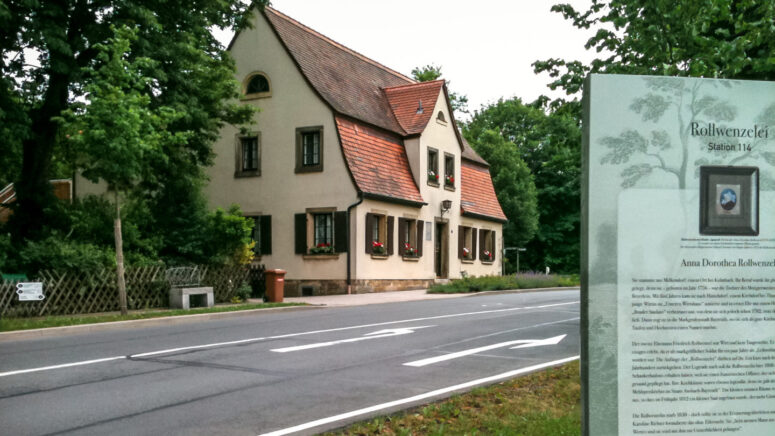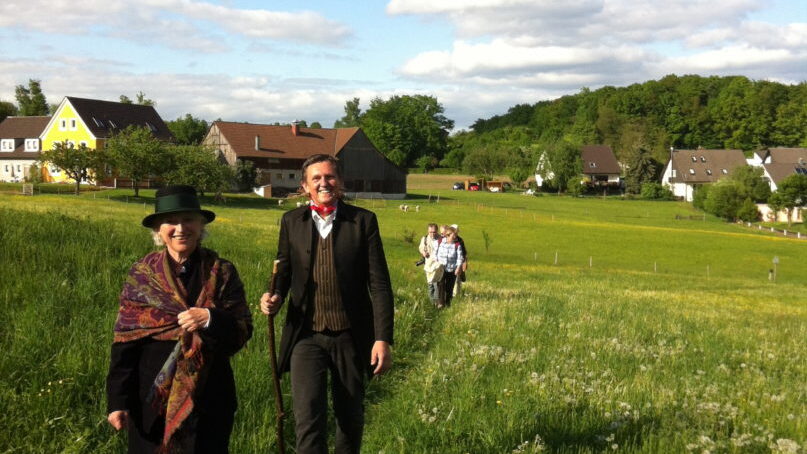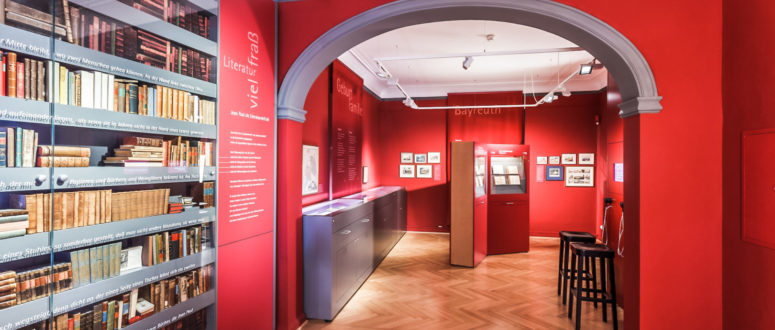Jean Paul lived and worked from 1804 until his death on November 14th 1825 in Bayreuth. Without a doubt he was one of the most significant German poets.
Inhaltsverzeichnis
Who is Jean Paul?
Jean Paul was born in Wunsiedel on March 21th 1763 (his name was actually Johann Paul Friederich Richter). His genius with words and his fanciful imaginativeness, his power of imagination, his flights of thoughts and pictures of dreams, his fantastic descriptions of nature and sensitive description of emotions are legendary.
As a bold visionary and enigmatic- humorous idyllist, an entrancing poet and worldly wise, a genius word creator and romantic thinker Jean Paul moves the mind and heart of people still today.
At the same time Jean Paul was a kind judge and friend of people, as seen in the caring description of original and whimsical figures like the famous school master Wuz.
His sketches of human character formation, of harmony, of peace and justice show him as the best example of the humane German.
Jean Paul and Bayreuth?
He wrote about Bayreuth the much cited homage: “dear Bayreuth, your are presented to me on such a beautifully worked- green painted tray of the area, one should drill oneself into you to never be able to leave again.” Jean Paul often moved his stories, in his encyclopedic novels, to Bayreuth and the surrounding area. In the year 1902, the critic Alfred Kerr wrote in the guestbook of the Jean Paul poet room in the Rollwenzelei: “forget the Germans you today, you are the master of Bayreuth!”
This was a grand homage to Jean Paul but at the same time a strike against Richard Wagner.
Jean Paul moved since 1804 seven times during his life in Bayreuth before he moved in 1813 for the larger part- and the rest of his life to the second floor of the house in the Friederichstrasse 384 (today Nr. 5). Landlord since 1817 was the Jewish banker from Ansbach I.J. Schwabacher who lived on the first floor of the house.
Life and death of Jean Paul
Jean Paul gave little interest to his outward appearance. His wife Caroline complained bitterly that her husband owned a beautiful dressing gown but always wore the shabby old one. Beer and wine are Jean Paul‘s essential elixirs since the turn of the century. The Bayreuth beer was not an item on the bottom of his list of arguments which spoke for Bayreuth as his final residence. However, the poet was not a drinker, as it so often likes to be generalized. He distributed his alcoholic mixtures according to plan, with great regularity throughout the day, for his drive to work. However he could not escape liver cirrhosis. Although he had retained a sparse nature as far as food, as in his youth, and his asking for potatoes, soup and salad is still touching today. Almost blind and plagued by ascites Jean Paul still deals with the planned total output of his works until his dying day. Only the last day, the nephew Otto Spazier (1803–1854) brought to help, finds him lying on the sofa. Their conversation continues until Jean Paul‘s words “we want to let it go”. His death occurred around 8 o clock at night.
Ludwig Börne said in his commemorative speech amongst other things: “a star has vanished and the eye of the century will close before he reappears because the shining genius wanders in wide paths and only late grandchildren will joyfully welcome from which mourning fathers once crying parted….. He had not lived for everyone but his time will come when he will be born for all and they will all mourn him. But he stands patiently at the gates of the twentieth century and waits smiling until the slow moving masses follow him.
Rollwenzelei — Jean Paul´s room for poetry
The house has a long history and a peculiarity rarely found: it is the house where the poet Jean Paul spent the last 20 years of his life, from about 1805 to 1825, working almost daily. The small tavern on the outskirts of the town was then run by the Rollwenzel couple. Refferring to the first owners, the house is still called the Rollwenzelei.
His “poet’s room”, which was made available to him by the innkeepers of the time, is still preserved in its original form today. The poet grew up in poor circumstances. This was also reflected in his poet’s room. Only the most necessary items were to be found in it. What was much more important, however, was that in this small room Jean Paul found the peace he needed to concentrate fully on his poetry. The wide view over the fields and meadows of Bayreuth’s nature helped him to find much needed inspiration.
As part of the 2006–2010 restoration, the Stube was restored as Jean Paul had seen it; furthermore, an exhibition area was added to probably the smallest museum in Germany.

Jean Paul trail

The hiking trail touches the Franconian forest and Franconian Switzerland. The trail was continued in 2012 to Sansparail and has length of 200 km.
You encounter Jean Paul‘s legacy still today in many ways. In the residence- and house of his death in the Friederichstrasse, the tomb in the city cemetery, the central monument on the Jean Paul place , the “Rollwenzelei” on the way to the Eremitage. He came to the restaurant of the Rollwenzelei almost daily to write. You find his legacy in the palaces and parks of the Eremitage and Fantaisie, which were places of some of his most beautiful scenes in his novels. All these places are connected through the Jean Paul way which leads through a large part of upper Franconia. The Bayreuth Jean Paul way was put on record in 2010.
Numerous informative plaques on different places let the reader dive into the life and works of the poet.


